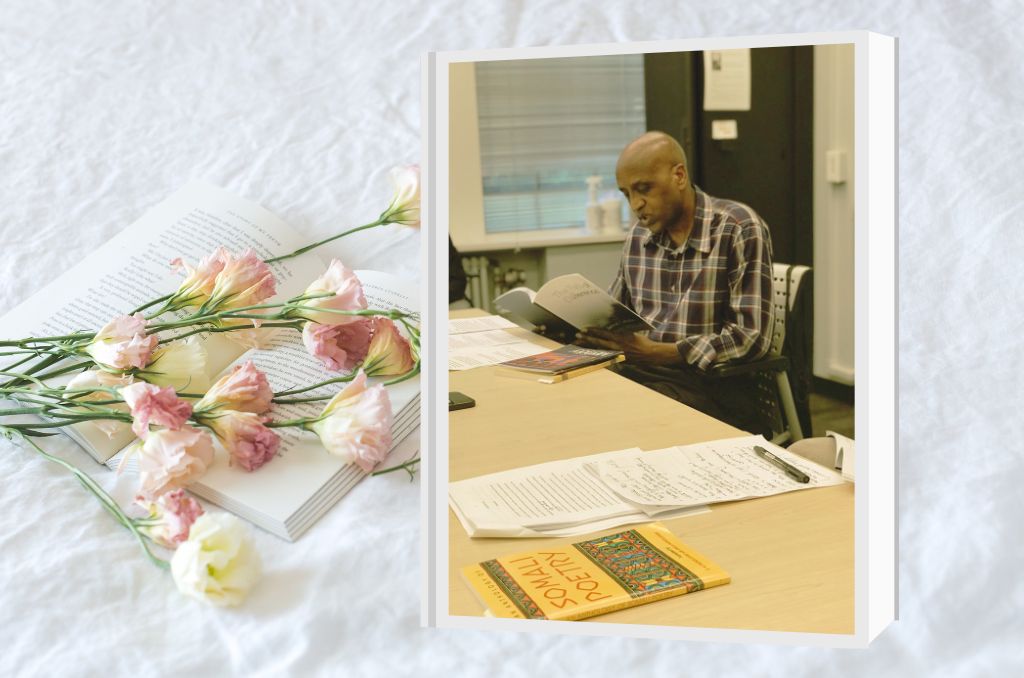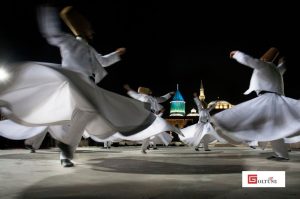
I read the word “poet” in the description of an email I received from the Middle Eastern Language and Culture, MELC, department at the University of Washington. The word “poet” was enough to encourage me to attend “a conversation with Jamal Gabobe, Somali-American poet.” Besides, it was the best excuse to visit my beloved beautiful university once more.
The meeting at UW started at 6 pm. I knew I needed a minimum of one hour to get myself to the meeting. First I had to drive to the campus and find a parking spot. Then, I needed to walk to the Thomson Hall; whose location I did not know. The meeting would take place on the 3rd floor of the Thomson Hall. One hour was the minimum requirement to get there on time.
Gabobe published two books of poems in English: The Path of Difference, and Love and Memory.
Right before I got my keys around 5:05 to leave the house, my hubby declared that he wanted to take a romantic walk with me. He needed to decide about an urgent matter. He wanted to know my input. To walk and talk about the matter was a perfect idea. But, what about my poetry meeting?! “I can only walk for 10 min. Would that work?,” I asked. “Yeah, that’s enough,” he replied.
I found myself inside the car at 5:18. “Perfect,” I whispered, “I am going to be late.”
To make the matter even more perfect, I was stuck at the awful Seattle traffic. There was no point in being agitated and angry. I decided to take it easy and stay cool amid the hot temperature outside. It was around 6:08 when I parked my car at the Kane Hall parking lot. It took me another 20 minutes to find Thomson building, and less than 3 minutes to sit myself on the chair close to the poet. “Somali poets are very educated people, just like poets in most cultures,” I heard him saying. I tried to catch my breath. I quietly pulled my phone out of my handbag to place it on the table right in front of me. It showed 6:39.
Jamal Gabobe, Somaliland Poet
Born in Somaliland and, raised in Yemen, the poet, Jamal Gabobe, earned his Ph.D. in Comparative Literature from the University of Washington. He published two books of poems in English: The Path of Difference (April 2021) and Love and Memory (June 1996), and another book of poems in Arabic. He has written essays on modern Egyptian literature, and European travel writings. Gabobe’s command of English and Arabic has earned him a deep understanding of multiple cultures and ways of thinking.
A writer of love poems himself, Gabobe researched Bodari’s legendary love.
Gabobe was sitting next to Professor Hamza Zafer, facing me, when he replied to Zafer’s question about Elmi Boudari, and his unmet love for a girl in Somaliland.
Bodari’s Legendary Love Affair and Poems
A writer of love poems himself, Gabobe researched Bodari’s legendary love, an age-old story: Bodari meets a girl. He loses the girl. Bodari becomes immortalized via the object of his desire.
 From Gwen Tompkins report on NPR:
From Gwen Tompkins report on NPR:
It happened in a tiny bakery in the port city of Berbera. There, Bodari worked as a laborer for his uncle, making bread and selling it in what was then British Somaliland. Under the bakery’s low ceiling, within ochre-colored walls, over a high counter worn smooth by a million touches, an ardor was born like no other. Nour Haban runs the bakery now, and says it happened in an instant: Bodari saw a girl named Hodhan — and began speaking in verse.
“It was so much like the story between Rumi and Shams,” Gabobe said. “Rumi wasn’t a poet before meeting Shams. But after their meeting, poems poured out of his heart and mind.”
Rumi and Shams’ Spiritual Love
 The love between Rumi and Shams Tabriz is one of the greatest spiritual connections in history. Rumi’s eternal thirst for knowledge and truth and Shams’ mysticism is what brought these two great poets together. Only after meeting Shams, Rumi created his masterpiece Mathnavi, and became the prophet of Sufism, Islamic mysticism. Gabobe explained the relation between Bodari’s love and Rumi’s love in his essay “Elmi Bodari and the Construction of the Modern Somaliland Subject in a Colonial and Sufi Context.”
The love between Rumi and Shams Tabriz is one of the greatest spiritual connections in history. Rumi’s eternal thirst for knowledge and truth and Shams’ mysticism is what brought these two great poets together. Only after meeting Shams, Rumi created his masterpiece Mathnavi, and became the prophet of Sufism, Islamic mysticism. Gabobe explained the relation between Bodari’s love and Rumi’s love in his essay “Elmi Bodari and the Construction of the Modern Somaliland Subject in a Colonial and Sufi Context.”
After the book reading, I walked out with Gabobe to get into my car. As he explained more about Bodari, and Somaliland’s poetry landscape, I could see how much he loved Somaliland, Arab literature, and words. In the end, I was able to compensate for my “lateness” with the walk at the beautiful campus.
God’s Poems
We said our goodbyes. Yet, I continued walking into the gardens of the campus, enjoying the pleasant fresh air and birds chirping. God was reciting Its own poetry.
Please Pledge to Our Peace Journalism.
Goltune is editorially independent. We set our agenda. No one edits our editors. No one steers our opinion. This is important as it enables us to stay true to our values.
Every contribution we receive from readers like you, big or small, goes directly into funding our journalism. Please support Goltune, large or small.
Send your contributions to our PayPal account: [email protected]
Or, Click the link to pledge your support.
Thank you,
Goltune Editorial Team






